-
 Bitcoin
Bitcoin $87,315.1852
3.56% -
 Ethereum
Ethereum $1,630.6745
3.43% -
 Tether USDt
Tether USDt $1.0000
-0.01% -
 XRP
XRP $2.1211
3.50% -
 BNB
BNB $601.3750
1.83% -
 Solana
Solana $139.4069
1.88% -
 USDC
USDC $1.0000
0.00% -
 Dogecoin
Dogecoin $0.1621
5.44% -
 TRON
TRON $0.2427
-1.07% -
 Cardano
Cardano $0.6408
4.12% -
 Chainlink
Chainlink $13.4721
4.10% -
 Avalanche
Avalanche $20.5905
6.44% -
 UNUS SED LEO
UNUS SED LEO $9.0293
-3.55% -
 Stellar
Stellar $0.2580
6.57% -
 Toncoin
Toncoin $3.0124
1.24% -
 Shiba Inu
Shiba Inu $0.0...01262
3.69% -
 Sui
Sui $2.2608
7.36% -
 Hedera
Hedera $0.1701
4.81% -
 Bitcoin Cash
Bitcoin Cash $340.3613
1.98% -
 Polkadot
Polkadot $3.9035
2.19% -
 Litecoin
Litecoin $80.3247
5.82% -
 Hyperliquid
Hyperliquid $17.9745
1.79% -
 Dai
Dai $1.0000
0.00% -
 Bitget Token
Bitget Token $4.4669
1.79% -
 Ethena USDe
Ethena USDe $0.9992
0.00% -
 Pi
Pi $0.6333
1.02% -
 Monero
Monero $215.0155
0.40% -
 Uniswap
Uniswap $5.4281
4.46% -
 Pepe
Pepe $0.0...07881
7.27% -
 Aptos
Aptos $5.1724
4.43%
Will the Bitcoin payment platform affect the payment business of traditional banks?
Bitcoin payment platforms challenge traditional banks with faster transactions and lower fees, but face hurdles in adoption and regulation.
Apr 19, 2025 at 09:56 am

The emergence of Bitcoin and other cryptocurrencies has sparked a significant debate about their impact on the traditional financial sector, particularly on the payment business of banks. The Bitcoin payment platform, with its decentralized nature and promise of lower transaction fees, poses both a challenge and an opportunity for traditional banks. This article will delve into how Bitcoin payment platforms might affect the payment business of traditional banks, exploring various aspects such as transaction speed, cost, security, and customer adoption.
Transaction Speed and Efficiency
One of the key features of Bitcoin payment platforms is their potential to offer faster transaction times compared to traditional banking systems. Traditional banks often process transactions through multiple intermediaries, which can lead to delays. In contrast, Bitcoin transactions are processed through a peer-to-peer network, which can significantly reduce the time required for funds to move from one account to another.
For instance, a Bitcoin transaction can be completed in minutes, whereas a bank transfer might take several days, especially for international transfers. This speed can be particularly appealing for businesses that need to move funds quickly.
However, it's important to note that Bitcoin's transaction speed can be affected by network congestion. During peak times, transactions might take longer to be confirmed, which could be a drawback for users expecting instant transfers.
Transaction Costs
Another area where Bitcoin payment platforms can impact traditional banks is in the realm of transaction costs. Bitcoin transactions typically have lower fees compared to those charged by banks for international transfers or even domestic payments. This is because Bitcoin eliminates the need for intermediaries, which often charge fees for their services.
For example, sending money internationally through a bank can incur fees of up to 5% of the transaction amount, whereas a Bitcoin transaction might cost less than 1%.
Despite this advantage, the volatility of Bitcoin's value can introduce additional costs for users who need to convert their cryptocurrency into fiat currency. This volatility can offset some of the savings on transaction fees.
Security and Privacy
Bitcoin payment platforms also offer a different approach to security and privacy compared to traditional banks. Bitcoin transactions are recorded on a public ledger called the blockchain, which provides a high level of transparency and security. However, this transparency can also be a double-edged sword, as it makes transactions traceable.
On the other hand, traditional banks offer more privacy for their customers, as transactions are not publicly visible. However, banks are also more susceptible to fraud and cyber-attacks, which can compromise customer data.
Bitcoin's use of cryptographic keys adds an additional layer of security, as users control their funds through private keys. This can be more secure than traditional banking systems, where banks hold the keys to customer accounts.
Customer Adoption and Regulatory Challenges
The adoption of Bitcoin payment platforms by customers is a critical factor in determining their impact on traditional banks. While some customers are eager to embrace the new technology, others remain wary due to the complexity and perceived risks associated with cryptocurrencies.
For instance, businesses that frequently engage in international trade might be more inclined to use Bitcoin to save on transaction costs. However, individual consumers might be less likely to adopt Bitcoin due to its volatility and the learning curve associated with managing cryptocurrencies.
Regulatory challenges also play a significant role in the adoption of Bitcoin payment platforms. Governments and financial regulators are still grappling with how to classify and regulate cryptocurrencies, which can create uncertainty for both users and businesses.
Integration with Traditional Banking Systems
Some traditional banks are beginning to explore ways to integrate Bitcoin and other cryptocurrencies into their existing payment systems. This integration can help banks stay competitive and offer their customers more options for making payments.
For example, some banks have started offering cryptocurrency trading services or allowing customers to hold cryptocurrencies in their accounts. This can help banks attract tech-savvy customers who are interested in cryptocurrencies.
However, integrating Bitcoin into traditional banking systems is not without challenges. Banks must navigate regulatory hurdles and ensure that they can manage the risks associated with cryptocurrencies, such as volatility and potential fraud.
Impact on Traditional Bank Revenue Streams
The rise of Bitcoin payment platforms could potentially disrupt traditional bank revenue streams, particularly those related to payment processing and international transfers. Banks earn significant revenue from transaction fees, and the adoption of Bitcoin could reduce this income.
For instance, if more businesses and consumers start using Bitcoin for payments, banks could see a decline in the volume of transactions processed through their systems. This could lead to a loss of revenue from transaction fees.
To mitigate this risk, some banks are exploring new revenue streams, such as offering cryptocurrency-related services or investing in blockchain technology. This can help them adapt to the changing landscape and maintain their profitability.
Frequently Asked Questions
Q: Can traditional banks completely replace their payment systems with Bitcoin?
A: It is highly unlikely that traditional banks would completely replace their payment systems with Bitcoin due to regulatory challenges, customer preferences, and the need to maintain a diverse range of payment options. However, banks may integrate Bitcoin and other cryptocurrencies into their existing systems to offer more choices to their customers.
Q: How do Bitcoin payment platforms handle disputes and chargebacks compared to traditional banks?
A: Bitcoin transactions are irreversible, which means there is no mechanism for chargebacks or refunds once a transaction is confirmed. In contrast, traditional banks offer dispute resolution services and can reverse transactions in cases of fraud or errors. This difference can be a significant consideration for businesses and consumers when choosing between Bitcoin and traditional banking systems.
Q: Are there any countries where Bitcoin payment platforms are more widely accepted than traditional bank payments?
A: While Bitcoin is gaining acceptance in various countries, it is still not as widely accepted as traditional bank payments in most places. However, some countries with less developed banking infrastructure, such as certain parts of Africa and Latin America, are seeing increased adoption of Bitcoin for payments due to its accessibility and lower costs.
Q: How do traditional banks view the rise of Bitcoin payment platforms?
A: Traditional banks have mixed views on the rise of Bitcoin payment platforms. Some see it as a threat to their business model, particularly in terms of transaction fees and international transfers. Others view it as an opportunity to innovate and offer new services to their customers. Many banks are taking a cautious approach, monitoring the development of cryptocurrencies and exploring ways to integrate them into their operations.
Disclaimer:info@kdj.com
The information provided is not trading advice. kdj.com does not assume any responsibility for any investments made based on the information provided in this article. Cryptocurrencies are highly volatile and it is highly recommended that you invest with caution after thorough research!
If you believe that the content used on this website infringes your copyright, please contact us immediately (info@kdj.com) and we will delete it promptly.
- Elixir AI Disrupts the Crypto World with Its Cutting-Edge 3D Content Generation Platform
- 2025-04-21 21:00:13
- The Next Big Thing in Web3? Bitcoin Consolidates as Investors Eye Three Top Altcoins: Mantra, Memecoin, and Pi Network
- 2025-04-21 21:00:13
- AI Coins Are on the Rise, $SUBBD Token Leads the Charge by 26%
- 2025-04-21 20:55:13
- MicroStrategy (MSTR) Continues Its Aggressive Bitcoin Buying Strategy in 2025
- 2025-04-21 20:55:13
- MicroStrategy ( Formerly Known as Microstrategy) Has Continued Its Aggressive Bitcoin Buying Strategy in 2025
- 2025-04-21 20:50:12
- MicroStrategy Buys the Dip, Adding 6,556 Bitcoin to Its Holdings
- 2025-04-21 20:50:12
Related knowledge
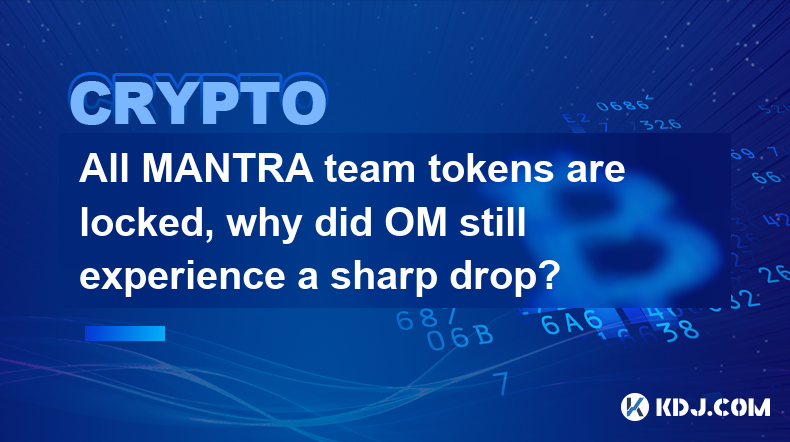
All MANTRA team tokens are locked, why did OM still experience a sharp drop?
Apr 20,2025 at 11:14am
Introduction to MANTRA and OM TokenThe MANTRA project is a blockchain platform that aims to provide a scalable and secure environment for decentralized applications (dApps). The native token of the MANTRA ecosystem is OM, which plays a crucial role in governance, staking, and other functionalities within the platform. Recently, the MANTRA team announced...
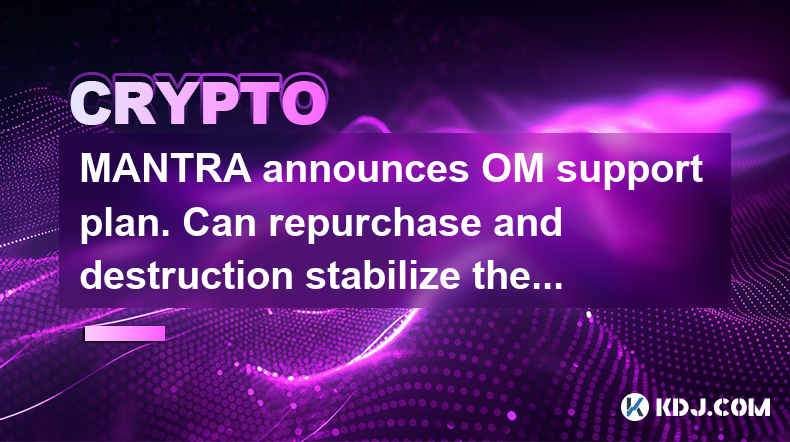
MANTRA announces OM support plan. Can repurchase and destruction stabilize the currency price?
Apr 21,2025 at 01:57pm
MANTRA, a notable player in the cryptocurrency ecosystem, has recently announced an OM support plan that includes mechanisms for repurchasing and destroying tokens. This move has sparked significant interest and discussion within the crypto community, particularly around its potential impact on the stability of the OM token's price. In this article, we ...

A large amount of OM was liquidated due to collateralization, causing a sharp drop? MANTRA analyzes the reasons for the market turmoil
Apr 21,2025 at 01:57am
The cryptocurrency market is known for its volatility, and sharp price movements can often be attributed to a variety of factors. Recently, a large amount of OM (Mantra DAO's native token) was liquidated due to collateralization issues, leading to significant market turmoil. In this article, MANTRA analyzes the reasons behind this event and the subseque...
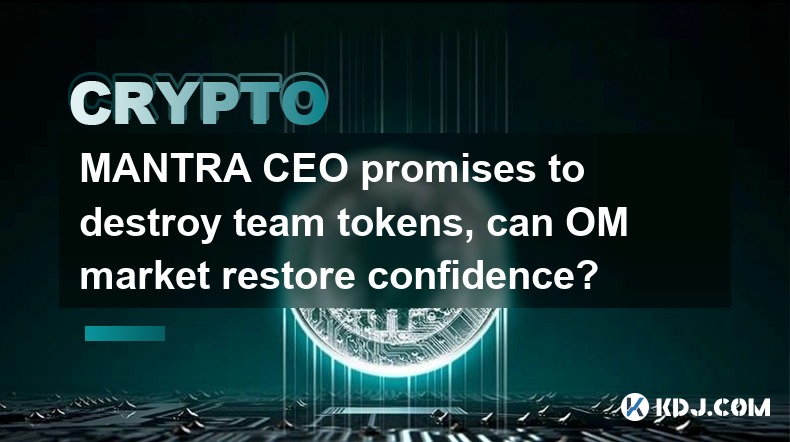
MANTRA CEO promises to destroy team tokens, can OM market restore confidence?
Apr 21,2025 at 08:28am
The recent announcement from the CEO of MANTRA about destroying team tokens has sparked a wave of discussions within the cryptocurrency community. This move is seen as a strategic effort to restore confidence in the OM market, which has been facing various challenges. The decision to burn team tokens is not just a simple action; it involves a series of ...
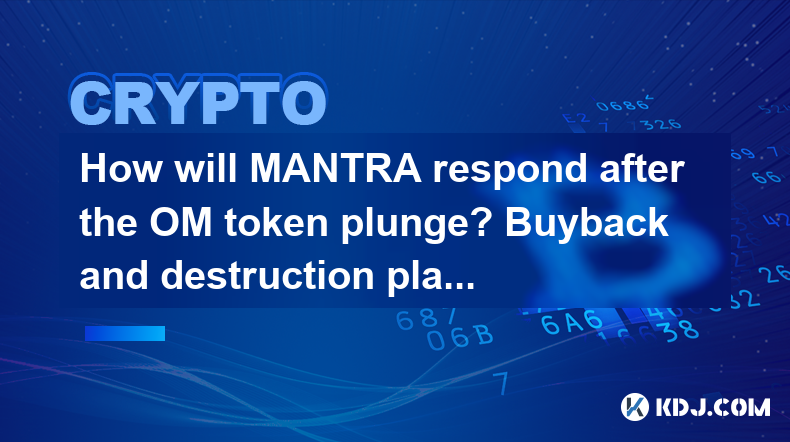
How will MANTRA respond after the OM token plunge? Buyback and destruction plan revealed
Apr 19,2025 at 11:42pm
The recent plunge in the OM token price has left many investors and enthusiasts of the MANTRA ecosystem concerned about the future stability and value of their holdings. In response to these market fluctuations, MANTRA has announced a comprehensive buyback and destruction plan aimed at restoring confidence and supporting the long-term health of the OM t...
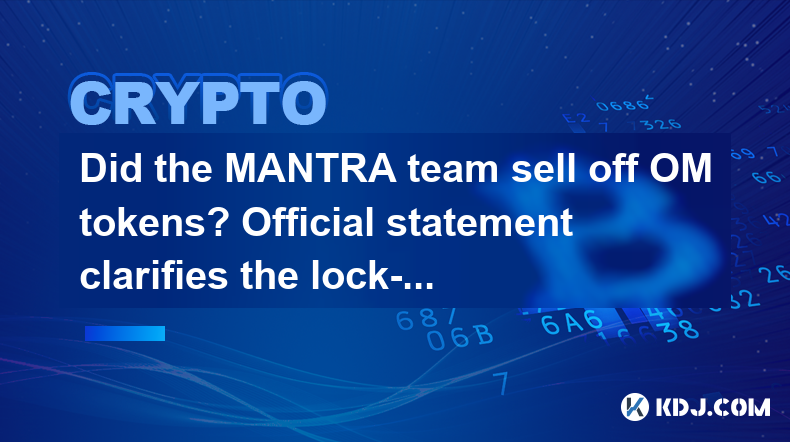
Did the MANTRA team sell off OM tokens? Official statement clarifies the lock-up situation
Apr 19,2025 at 10:56pm
The recent buzz around the MANTRA project and its native token, OM, has led to speculation and concerns within the cryptocurrency community about whether the MANTRA team has sold off their OM tokens. To address these concerns and clarify the situation, the MANTRA team has released an official statement detailing the lock-up situation of their tokens. Th...

All MANTRA team tokens are locked, why did OM still experience a sharp drop?
Apr 20,2025 at 11:14am
Introduction to MANTRA and OM TokenThe MANTRA project is a blockchain platform that aims to provide a scalable and secure environment for decentralized applications (dApps). The native token of the MANTRA ecosystem is OM, which plays a crucial role in governance, staking, and other functionalities within the platform. Recently, the MANTRA team announced...

MANTRA announces OM support plan. Can repurchase and destruction stabilize the currency price?
Apr 21,2025 at 01:57pm
MANTRA, a notable player in the cryptocurrency ecosystem, has recently announced an OM support plan that includes mechanisms for repurchasing and destroying tokens. This move has sparked significant interest and discussion within the crypto community, particularly around its potential impact on the stability of the OM token's price. In this article, we ...

A large amount of OM was liquidated due to collateralization, causing a sharp drop? MANTRA analyzes the reasons for the market turmoil
Apr 21,2025 at 01:57am
The cryptocurrency market is known for its volatility, and sharp price movements can often be attributed to a variety of factors. Recently, a large amount of OM (Mantra DAO's native token) was liquidated due to collateralization issues, leading to significant market turmoil. In this article, MANTRA analyzes the reasons behind this event and the subseque...

MANTRA CEO promises to destroy team tokens, can OM market restore confidence?
Apr 21,2025 at 08:28am
The recent announcement from the CEO of MANTRA about destroying team tokens has sparked a wave of discussions within the cryptocurrency community. This move is seen as a strategic effort to restore confidence in the OM market, which has been facing various challenges. The decision to burn team tokens is not just a simple action; it involves a series of ...

How will MANTRA respond after the OM token plunge? Buyback and destruction plan revealed
Apr 19,2025 at 11:42pm
The recent plunge in the OM token price has left many investors and enthusiasts of the MANTRA ecosystem concerned about the future stability and value of their holdings. In response to these market fluctuations, MANTRA has announced a comprehensive buyback and destruction plan aimed at restoring confidence and supporting the long-term health of the OM t...

Did the MANTRA team sell off OM tokens? Official statement clarifies the lock-up situation
Apr 19,2025 at 10:56pm
The recent buzz around the MANTRA project and its native token, OM, has led to speculation and concerns within the cryptocurrency community about whether the MANTRA team has sold off their OM tokens. To address these concerns and clarify the situation, the MANTRA team has released an official statement detailing the lock-up situation of their tokens. Th...
See all articles






















































































